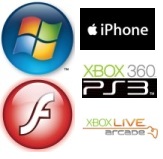What Platform Should You Develop Your Next Game For?
 I’ve been talking with a number of Indie game developer friends about what platform they should develop their next game for. There are a number of great platforms available to game developers and this choice of platform is critical to the success of your game. Many people have a game idea, but aren’t sure what platform is best for them, this article will help you in making that decision.
I’ve been talking with a number of Indie game developer friends about what platform they should develop their next game for. There are a number of great platforms available to game developers and this choice of platform is critical to the success of your game. Many people have a game idea, but aren’t sure what platform is best for them, this article will help you in making that decision.
So, Which Platform!?
The short answer is, it depends. There’s no silver bullet when it comes to platforms. Each has its strengths and weaknesses and the choice depends on the game you are creating. I have a set of questions below, move the sliders to represent your situation and see the recommendation for platforms. The further to the right the platform, the better it fits with your situation. If there’s a platform I’m missing you’d like added, please add a comment.
The Platforms
Now that you have your recommended platforms, I’ll give some more info on my thoughts on developer for each platform.
iPhone
The iPhone market is saturated with games and is getting worse every month. It seems nearly every indie game developer I know is making an iPhone game. My biggest recommendation is to make something small that stands out. The sales are very top heavy which means you’ll either make nothing or massive sales. The biggest issue is that the only real way to get in front of people is to be in the top 50 applications which is extremely difficult due to the market saturation.
The other gotcha is the requirement for both a Mac and learning Objective-C. There are a number of great engines out there (eg Unity) which I’d recommend using to speed up development.
Console
Unless you have funding, full version console games are almost impossible for an Indie to develop for. It’s really hard to get your game accepted by a console manufacturer (Microsoft, Sony, etc) and the certification process can be a nightmare.
PC
PC development is the most open and an easy to break into. There are many distribution methods (Steam, Impulse, self-publishing) to suit your games needs. Piracy is one of the biggest threats to your game and building a game that takes piracy into account is a good step forward. Something as simple as requiring users to login to a central server can help reduce piracy.
Web-Based
Web based games are the best place to get started, particularly if you just want to get a game “under your belt”. It’s a great way of reaching a wide audience quickly, however don’t expect too much in either money or respect. Web-based games are one of the hardest ways to make money from games (at this stage) and tends to have one of the most immature communities of all platforms. Lost Garden has a great set of articles that discusses generating real money for web-based (primarily flash) games.
XBox Live Arcade
XBLA games are like a cut-down version of a console release. It’s much easier to get accepted and get through certification. There are also less rewards/potential for your game compared to a full version console game. As the name suggests, XBLA is perfect for smaller “arcade” style games.
Multiple Platforms
One recommendation I would make is to start small. Look at developing a smaller version (or prototype) of your game on one of the low-end platforms (flash or iPhone) to gauge the response to your game. If it’s successful, then put the extra time and money into developing a larger version of your game on a higher-end platform. John Carmack has stated his belief in developing for low-end platforms first. This helps you focus on the core fun of a game, rather than flashy graphics or other “next-gen” features that don’t necessarily make the game better.
Conclusion
You should now have a better idea of what platform to develop your next game for. If there’s a platform I haven’t discussed that you ‘d like to hear about, leave a comment and I’ll add it to the list. The important thing to remember is that no platform is perfect. They each have their own strengths and weaknesses and it’s critical that you chose the platform that best fits with your game.
 I build software. The best place to find me is on
I build software. The best place to find me is on